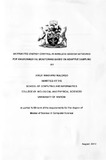| dc.contributor.author | Mulongo, Abiud W | |
| dc.date.accessioned | 2013-02-28T13:44:43Z | |
| dc.date.issued | 2012 | |
| dc.identifier.citation | Master of Science in Computer Science | en |
| dc.identifier.uri | http://erepository.uonbi.ac.ke:8080/xmlui/handle/123456789/12485 | |
| dc.description.abstract | A common application of wireless sensor networks (WSNs) is in environmental monitoring where a high spatial
density of WSNs is deployed in a region to monitor a physical process such as the variation of surface temperature.
In some specific applications continuous monitoring is required in order to achieve a high temporal resolution of
data. A conflicting requirement in the design of WSNs for such applications is the need to conserve as much energy
as possible for prolonged operation (since WSNs are powered by energy constrained batteries) versus the need to
address certain application specific quality of service parameters such as data accuracy and timeliness of data
delivery. One approach to this dilemma is to use the concept of adaptive sampling. When designing an adaptive
sampling algorithm the biggest challenge is to determine the number of samples collected at any given time in order
to tradeoff energy consumption and quality of information. The goal of this research was to balance energy
consumption across nodes at system level and to balance energy consumption against quality of information at the
nodal level. To this end, we proposed DASS (Distributed Adaptive Sensing and Sampling) algorithm. The adaptive
sensing protocol was implemented in a simulation environment (OPNET/OpenZB on top of the IEEE
802.15.4/Zigbee model). It was compared to the fixed sampling algorithm in terms of mean energy consumed
(joules), Message reduction percentage (MRP) and mean time between samples as the performance metrics. For
Quality of information (QoI) we used packet success probability and end to end delay to determine the completeness
of information and timeliness of information respectively. Our results demonstrate that DASS can save upto 57% of
energy at a PSP of91 % with several factors of improvement in delay compared to the fixed sampling strategy. | en |
| dc.description.sponsorship | University of Nairobi | en |
| dc.language.iso | en | en |
| dc.publisher | University of Nairobi | en |
| dc.title | Distributed energy control in wireless sensor networks for environmental monitoring based on adaptive sampling | en |
| dc.type | Thesis | en |
| local.publisher | School of Computing and Informatics | en |

